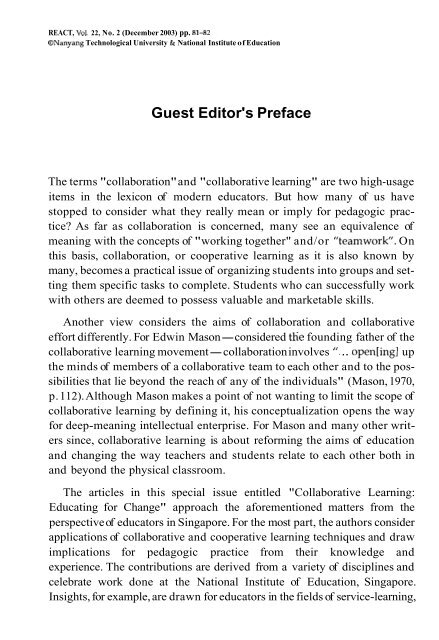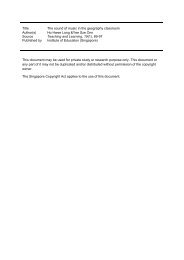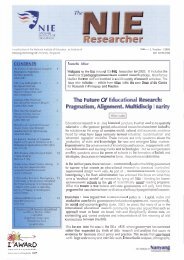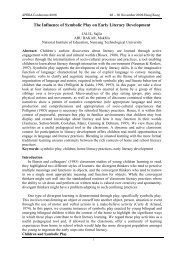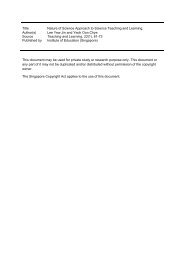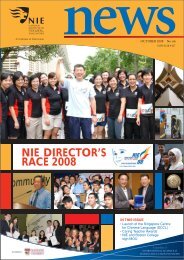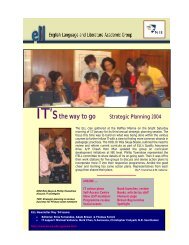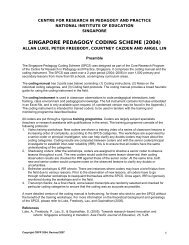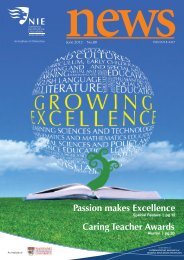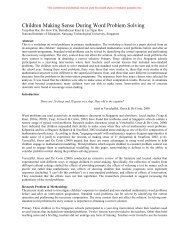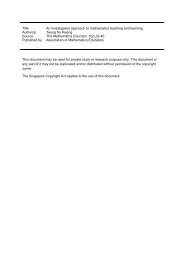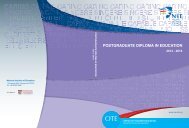Cooperative Learning - NIE Digital Repository - National Institute of ...
Cooperative Learning - NIE Digital Repository - National Institute of ...
Cooperative Learning - NIE Digital Repository - National Institute of ...
You also want an ePaper? Increase the reach of your titles
YUMPU automatically turns print PDFs into web optimized ePapers that Google loves.
REACT, Vol. 22, No. 2 (December 2003) pp. 81-02ONanyang Technological University & <strong>National</strong> <strong>Institute</strong> <strong>of</strong> EducationGuest Editor's PrefaceThe terms "collaboration" and "collaborative learning" are two high-usageitems in the lexicon <strong>of</strong> modern educators. But how many <strong>of</strong> us havestopped to consider what they really mean or imply for pedagogic practice?As far as collaboration is concerned, many see an equivalence <strong>of</strong>meaning with the concepts <strong>of</strong> "working together" and/or "teamwork". Onthis basis, collaboration, or cooperative learning as it is also known bymany, becomes a practical issue <strong>of</strong> organizing students into groups and settingthem specific tasks to complete. Students who can successfully workwith others are deemed to possess valuable and marketable skills.Another view considers the aims <strong>of</strong> collaboration and collaborativeeffort differently. For Edwin Mason-considered the founding father <strong>of</strong> thecollaborative learning movement-collaboration involves ". . . open[ingl upthe minds <strong>of</strong> members <strong>of</strong> a collaborative team to each other and to the possibilitiesthat lie beyond the reach <strong>of</strong> any <strong>of</strong> the individuals" (Mason, 1970,p. 112). Although Mason makes a point <strong>of</strong> not wanting to limit the scope <strong>of</strong>collaborative learning by defining it, his conceptualization opens the wayfor deep-meaning intellectual enterprise. For Mason and many other writerssince, collaborative learning is about reforming the aims <strong>of</strong> educationand changing the way teachers and students relate to each other both inand beyond the physical classroom.The articles in this special issue entitled "Collaborative <strong>Learning</strong>:Educating for Change" approach the aforementioned matters from theperspective <strong>of</strong> educators in Singapore. For the most part, the authors considerapplications <strong>of</strong> collaborative and cooperative learning techniques and drawimplications for pedagogic practice from their knowledge andexperience. The contributions are derived from a variety <strong>of</strong> disciplines andcelebrate work done at the <strong>National</strong> <strong>Institute</strong> <strong>of</strong> Education, Singapore.Insights, for example, are drawn for educators in the fields <strong>of</strong> service-learning,


